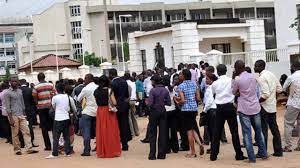By Chidi Odinkalu
On this day 75 years ago, on
December 10, 1948, the General Assembly of the United Nations adopted the
Universal Declaration of Human Rights “as a common standard of achievement for
all peoples and all nations”. Forty-eight of the 58 countries eligible voted to
approve the Declaration. The Byelorussian Soviet Socialist Republic,
Czechoslovakia, Poland, Saudi Arabia, Soviet Union, South Africa, Ukraine, and
Yugoslavia abstained, while Honduras and Yemen absented themselves from the
vote altogether. There were no votes against its adoption.

The previous day, on
December 9, 1948, they had adopted the Convention on the Prevention and
Punishment of the Crime of Genocide and just three and a half years earlier, in
June 1945, 50 countries had signed the Charter of the United Nations
establishing the foundations for a new global order at the end of a profoundly
ruinous war. In the three years separating the adoption of the UN Charter from
the Universal Declaration, more countries emerged to independence, including
Korea, India, Indonesia, Philippines, Myanmar, Pakistan, Syria, and Vietnam. In
the decade that followed, the cascade of decolonisation arrived Africa.




















